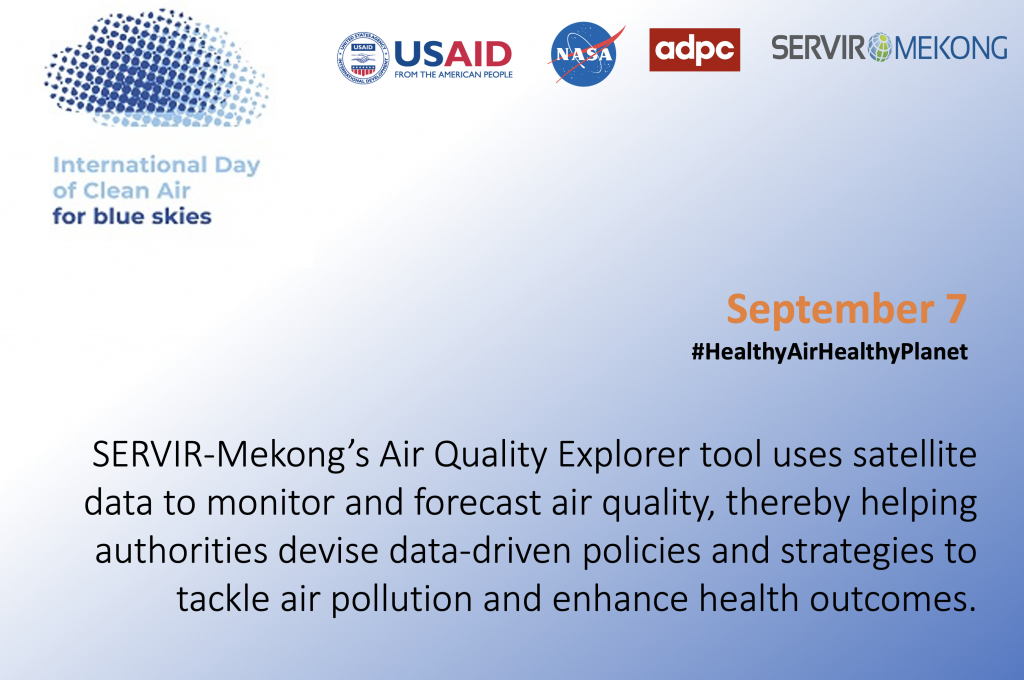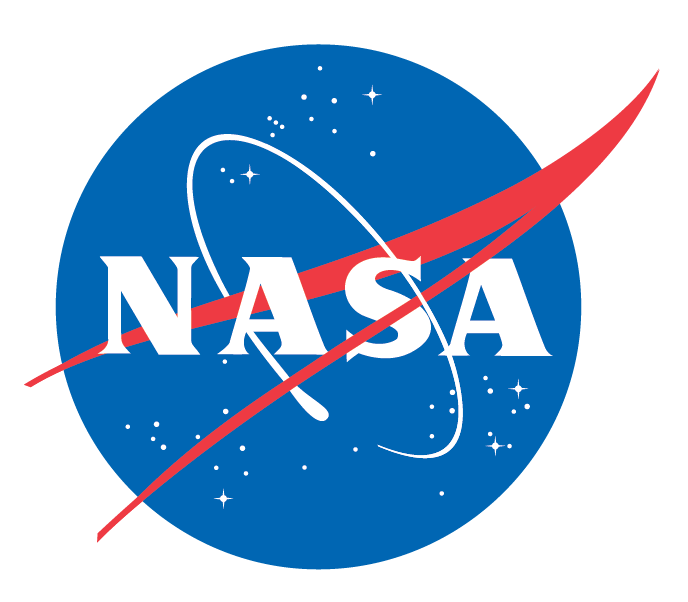SERVIR-Mekong Supports UN’s International Day of Clean Air for Blue Skies

What is the International Day of Clean Air for Blue Skies?
The United Nations General Assembly in 2019 declared September 7 as the International Day of Clean Air for Blue Skies. The General Assembly was encouraged by an increasing interest of the international community in clean air, and emphasizing the need to make further efforts to improve air quality, including reducing air pollution, to protect human health. This year’s theme of “Healthy Air, Healthy Planet” focuses on the global nature of clean air.
Why is it important?
According to António Guterres, UN Secretary General, “Today, as many as nine out of ten people breathe polluted air, leading to some 7 million premature deaths each year, of whom 600,000 are children.” This number, he adds, could double by 2050, if we do not act decisively. In Thailand, agricultural burning and forest fires, including transboundary haze, have contributed to high levels of air pollution. Forest fires release particulate matter (PM) into the atmosphere. PM is a common proxy indicator of air pollution consisting of sulfates, nitrates, ammonia, sodium chloride, black carbon, mineral dust and water. PM2.5 refers to microscopic particles with a diameter of 2.5 microns or less (30 times smaller than the diameter of the human hair.)
Forest fires have a huge impact on the health of communities living in adjoining areas, and beyond. PM2.5 released during forest fires and agricultural burning can penetrate the lung barrier and enter the blood system. Chronic exposure to PM2.5 increases the risk of developing cardiovascular and respiratory diseases, as well as of lung cancer. According to recent research published by The Energy Policy Institute at the University of Chicago, long-term exposure to fine particulate pollution is shortening the average life expectancy in Thailand by more than two years.
What are we doing to improve air quality?
SERVIR-Mekong is a unique partnership between the U.S. Agency for International Development (USAID) and the U.S. National Aeronautics and Space Administration (NASA). SERVIR-Mekong developed the Air Quality Explorer tool that uses satellite data to monitor and forecast air quality, thereby helping authorities devise data-driven policies and strategies to tackle air pollution and enhance health outcomes.
In Northern Thailand, SERVIR-Mekong’s Air Quality Explorer Tool’s customized fire hotspot data is being used by first responders and forest officials to pinpoint the exact location of the fire hotspots and undertake targeted interventions to put out the fires. Timely management of fire hotspots helps to reduce pollution in the atmosphere and enhance health outcomes; it also promotes the sustainable management of landscapes in the long term.
How is air quality linked with climate change?
Climate change can impact air quality and, conversely, air quality can impact climate change like a virtuous cycle. According to the European Union’s Science for Environmental Policy’s issue on Air pollution and Climate Change, burning carbon-based fuels emits carbon dioxide (CO2) and other pollutants, including particulate matter that can cool or heat the Earth’s climate by reflecting or absorbing radiation from the sun. One type of particulate matter, namely black carbon, remains in the atmosphere for a relatively short time (one week), but strongly absorbs solar radiation. Black carbon emitted from domestic burning of solid fuels, forest fires, and high emitting diesel engines is likely to contribute to warming the climate. Black carbon is estimated to be responsible for approximately 15 percent of the current excessive warming of global temperatures. Additionally, climate change is likely to increase concentrations of ozone, one of the most important urban air pollutants responsible for respiratory problems. Short-term reductions in black carbon can potentially delay the impact of global warming by approximately 10 years.
How can you support clean air for blue skies?
All of us have a role to play, collectively and individually, in ensuring that the air we breathe is clean. We have a collective responsibility to leave clean air and blue skies for future generations. Individually, the decisions we make on a daily basis can help this cause. We should use public transport post COVID and when it is safe to do so. When public transport is unavailable, we should use zero emission vehicles, including bicycles, for personal mobility and make car-pooling a habit.
As a society, we need to push for better monitoring technologies including low-cost sensors to identify sources of air pollution. We need to leverage the power of geospatial technologies and big data to enhance and inform regional collaboration to address transboundary air pollution issues. Geospatial technologies can also be used for sustainable forest management together with prevention and mitigation of forest fires. Geospatial technologies like the ones being used in SERVIR-Mekong’s Air Quality explorer can be leveraged by authorities to make data-driven health guidelines at the local and the national scale and pass national legislation to help meet World Health Organization’s Air Quality Guidelines.
We need to demand greater access to public transport while we formulate stronger emissions standards on vehicles, power plants, construction and industries to cut pollution. As a society, we need to transition towards clean cooking and clean heating and increase investments in renewable energy. We must phase out coal completely. In doing so, we will not only clean up our atmosphere but according to António Guterres, 150 million lives could be saved in this century.



